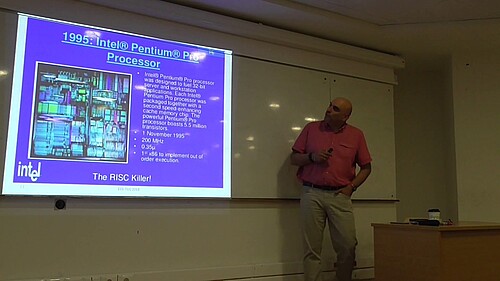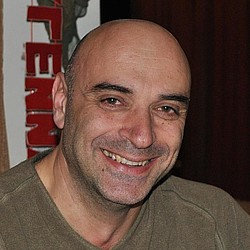Computer Architecture today: Efficient Computation with Heterogeneous Architectures
Dr. Dionisios N. Pnevmatikatos, Professor, School of Electrical &, Computer Engineering, Technical University of Crete
Wednesday, 9/5/2018, 2pm, 145.Π42
Computer Architecture and its flagship, microprocessors, have been around for more than 40 years; it has been a tremendous ride in many respects: performance, complexity, size are a few. Innovation and technological advancements -despite of its restrictions- led to steady and rapid improvements in computing systems. Power and energy consumption restrictions led to a plateau in operating frequency that is not increasing for the last several years, and also in restrictions in the use of the additional transistors made available by technology improvements. Thus, efficiency is now a prime factor in the design of any type of processing system.
In this talk I will give a short overview of processor history until today where heterogeneous systems are widespread. The emphasis of the talk will be heterogeneous systems either in their established approach (CPU+GPU) or in reconfigurable systems. The spread of heterogeneous systems is still in its beginnings, and the trend will be continuing at least for the near future. Its consequences are already obvious in Computer Architecture as well as in programming (languages, libraries, software systems, etc). Also, these systems are appropriate for the integration of machine learning support that is predicted to be ubiquitous in future computing system
*Dr. Dionisios N. Pnevmatikatos *(male) is a Professor and Director of the Microprocessor and Hardware Laboratory (MHL) at the School of Electrical and Computer Engineering, Technical University of Crete (TUC), and a research associate with FORTH-ICS since 1997. He received his PhD in Computer Science in 1995 from the University of Wisconsin–Madison. He has participated as a coordinator in FASTER FP7 EU project, and as Principal Investigator in the DeSyRe FP7 and the AXIOM, dRedBox(ongoing), and EXTRA (ongoing) H2020 projects, as well as for several national projects. His research interests include Computer Architecture, with a focus on using reconfigurable computing to create highly efficient, accelerated, heterogeneous parallel/rack-scale systems. He has also worked on Reliable System Design, Networking Hardware and Network Processors, Application Acceleration, Custom and Application-Specific Architectures, and Hardware Acceleration of Bioinformatics Algorithms. He has been in the Program Committee of conferences such as ISCA, FPL and DATE in Computer Architecture and Reconfigurable Applications topics, and has been a Program (co)chair for SAMOS 2018 and FPL 2011.
Recording





